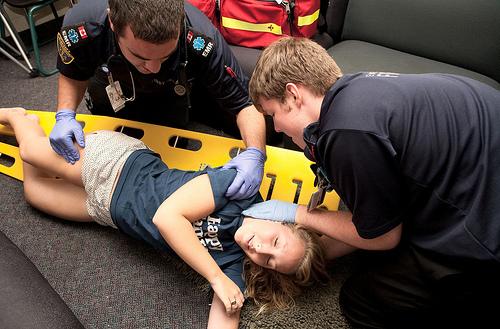By Carolyn Turgeon
Hospital visits for drunk first-year students are nothing new for residence. But with the volunteer-run first aid team now back in operation, students will have another group assessing their health before being carted off to hospital and receiving demerit points.
RyeSERT (Ryerson Student Emergency Response Team) provides emergency first aid care in residence. When security receives a call about a student, they dispatch both RyeSERT and a security member. However, the group took a break from operations in September to re-structure their team of emergency responders.
Posters advertising the operational team and seeking new members recently appeared in Pitman Hall.
While the group was defunct, Ryerson security and residence advisors took over their first-responder responsibilities . When security is called to check out a student, they have a checklist to assess the student’s level of consciousness, and whether or not they’re having difficulty breathing. The checklist helps security decide whether or not to send the student to hospital.
“Once the ambulance arrives the student has the ability to say no and sign a waiver,” said Chad Nuttall, manager of Student Housing Services.
Students also receive demerit points, particularly in extreme cases like this.
“Whether (drinking) happens here or not they will get points, especially because most are underage,”
Nuttall said.
The threat of punishment could scare students from asking for medical help.
“I hope they wouldn’t be,” he said. “The message we send is to make sure everyone’s safe.”
He said one of the pros of having RyeSERT was students could get medical advice from their peers without getting into trouble.
Several students who would have used RyeSERT’s services were sent to hospital this year, but didn’t need any medical treatment.
Kelly Fitzpatrick, a first-year fashion design student, had too much to drink and got sick when she got back to Pitman Hall last semester.
The security guard working the front desk called an ambulance.
Fitzpatrick was put on a gurney and rushed to Mount Sinai Hospital, where she waited for a doctor.
“The doctor came and said ‘there’s the bathroom, clean yourself up and you’re good,’” said Fitzpatrick. “That was the extent of the medical treatment.”
To top off her experience, she was charged with an ambulance bill of more than $200.
Carla*, a first-year nutrition student, lost track of how much she was drinking last October and got sick on the way back to residence.
She got into the building with no trouble, but was sick once again when she got upstairs.
Security saw her and called an ambulance, which took her to Toronto Western Hospital.
“I don’t feel like I really had to go,” said Carla*. “My friend didn’t think so and neither did the ambulance worker or the doctor.”
Though he declared that she had consumed the alcohol equivalent of 29 drinks, the doctor said she was alright and discharged her early.
Carla* was charged with a $45 ambulance bill, the amount a patient must pay when the doctor declares the ambulance necessary.
If the trip to the emergency room is deemed unnecessary by a physician, the bill totals $240.
Photo by: Chris Dale
*Name has been changed for privacy.










Leave a Reply